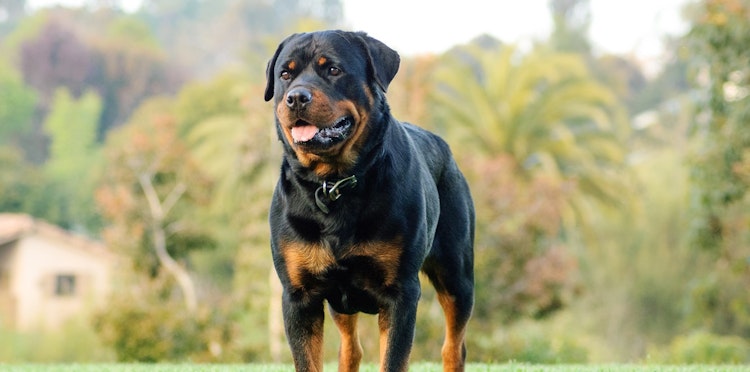Thinking of getting a Rottweiler? A guide to the breed

Getting to know Rottweilers
It is thought their ancestry comes from Roman times, but the breed we know today is from Germany. As working dogs, they were bred mainly to guard and herd sheep. They were also known as Butcher’s dogs and would pull a small cart, carrying meat to market and the money bag around their neck.
They are large dogs and tend to grow to between 56-69cm in height (at their withers) and can weigh between 35-60 kg. Due to their size and weight, it’s worth remembering they require quite a lot of dog food, which can be costly!
Rottweilers’ strong instinct to guard has unfortunately led to them gaining a negative reputation over the years. However, providing they have consistent training and socialisation from birth, they are loyal and loving dogs.
What does a Rottweiler need?
Exercise and mental stimulation
Rottweilers need plenty of exercise and mental stimulation for them to be happy dogs. Since they were bred to be working dogs, they suit an experienced owner who can ‘give them a job’. Rottweilers make excellent guard dogs and have been used with great success as police dogs.
Ideally, in a home environment, they need two good walks a day, plus games or training to keep their mind occupied. Due to their intelligence and athletic ability, they can turn their paws to fun classes, including dog agility! Interactive games with their owner, such as fetch the ball or find the treat, give Rotties the mental stimulation they need.
Training and socialisation
Starting training and socialisation from birth is essential with Rottweilers. Buying your puppy from a Kennel Club registered, experienced breeder means that this process will have already begun by the time your Rottie puppy comes home with you. Look for Rottweiler parents that have been ‘temperament assessed'. These assessments test how the dog reacts in the different situations they will come across in daily life. Dogs will only pass this test if they have a sound temperament.
Thanks to their intelligence, Rottweilers are easy to train. Their natural instinct is to guard and protect, which needs to be kept under control. Experience in handling and training big, powerful dogs is needed. Using positive reinforcement techniques, whilst being firm and consistent, works well with Rotties. They will learn quickly! But they can pick up bad habits just as fast, hence the need for consistent training. For this reason, they are not the best choice as a first dog.
Rottweilers do have a high prey drive. By introducing them to many different dogs and animals from the beginning of their lives, backed up with positive training techniques, Rotties can live with other dogs. Exercise caution with Rottweilers around cats and small furries due to their strong chase instincts.
Due to size alone, Rottweilers might not be the best choice of breed if you have very young children as the puppies can be playful and boisterous. They are still great family pets and thrive in a home environment. Rotties do not cope well if they are left alone for long periods as they can suffer from separation anxiety. If someone is at home with them most of the day, you’ll find they are loyal and loving companions who like to follow their family member around!
Whilst bred to be working dogs, if well-trained and socialised from an early age by experienced dog owners, the Rottweiler makes an excellent family dog.
Grooming and other care
Rottweillers are low to moderate shedders, with short coats. This makes them is easy to maintain when it comes to grooming.
Like most dogs, Rotties like their food! Without adequate exercise, they can become obese, which can put them at risk of developing health issues that will shorten their lives. Keep an eye on their calorie intake and make sure they get plenty of exercise.
In conclusion, if you are prepared to spend time training and exercising your Rottweiler, you will find you have a dedicated and majestic canine friend who will be a much-loved member of your family.


